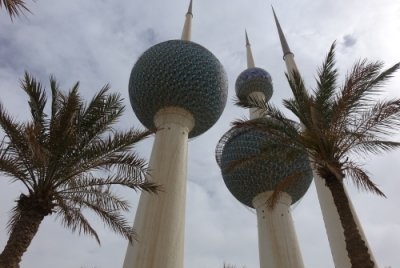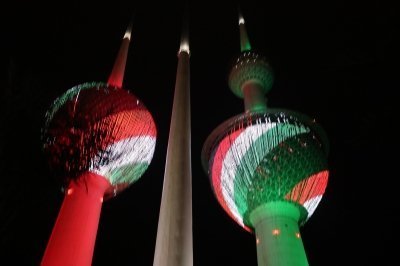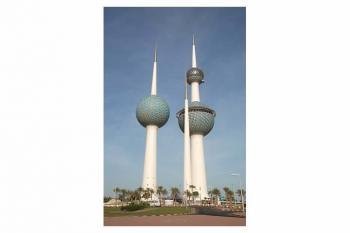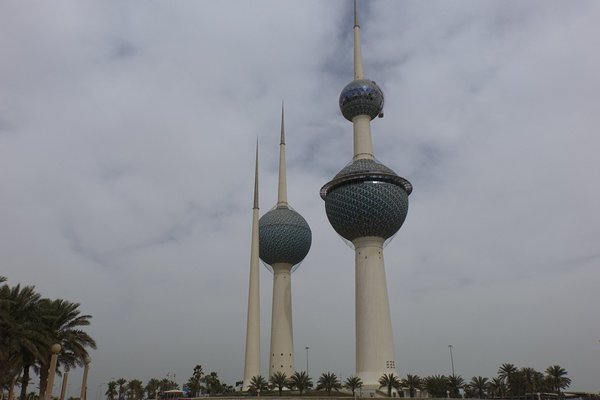Kuwait
Abraj Al-Kuwait
Abraj Al-Kuwait comprises an iconic water storage and supply system. The water towers are seen as the symbol of Kuwait's modernization in the 20th century, with rapid economic growth and urbanization. The design is seen as a mix of Arabic culture (shaped like a minaret and with blue mosaics) and Western technology. The concrete towers have retained their original function.
Site Info
Official Information
- Full Name
- Abraj Al-Kuwait (ID: 5933)
- Country
- Kuwait
- Status
-
On tentative list 2014
Site history
History of Abraj Al-Kuwait
- 2014: Added to Tentative List
- Added to tentative list
- Type
- Cultural
- Criteria
Links
All Links
No links available.
Community Information
- Community Category
- Secular structure: Civic and Public Works
Travel Information
Recent Connections
News
No news.
Community Reviews
Show full reviews
The Kuwait Towers (Abraj Al-Kuwait in Arabic) is the most promising entry on Kuwait’s Tentative List. A visit is a great excuse to immerse yourself in the recent history of Kuwait. Next to the brash United Arab Emirates and Qatar, Kuwait is often overlooked. But economically it has bounced back nicely after recovering from the Iraqi occupation during the Gulf War (1990-1991). It has the fourth highest per capita income in the world according to the World Bank, and it is considered the region’s shining example on liberal achievements such as press freedom and gender equality.
The Towers are conveniently located in the heart of Kuwait City. They store water that is pumped from seawater distillation plants, and thus represent the network of modern water distribution among the population. The 3 that are known as the Kuwait Towers are the showpieces among the 34 water towers from the 1970s that lie scattered around Kuwait. Ironically only 1.5 out of these 3 provide the core function of storing water (the second one holds a viewing tower cum restaurant on top of the water reservoir and the third one only is there to illuminate the other two and for decoration I guess!).
The Kuwait Towers were damaged for 75% during the Iraqi occupation, but as the object of national identity they were rebuilt quickly and reopened in 1992. They date from the period that Kuwait enjoyed such a great oil-driven prosperity that it was equalled by few if any country around the …
Keep reading 0 comments
The Kuwait towers belong to the category I like to call "My First UNESCO": nominate anything as a WHS, make semi-sensible OUV description and you will get nominated if your country doesn't have a WHS of its own. I could look at some candidates. But I actually liked Kuwait towers, as they are an artistic and architectural representation of water towers, a structure inherent and important to the country. They were designed and built in seventies, by Swedish architects and Yugoslavian gastarbeiters were used in the making. They're a mix of actual water towers, observatory and restaurant. There's an observation deck open until 11 p.m. and you can get inside at the last moment. The entrance fee is 6 kuwaiti dinars. We enjoyed our visit, though I have to say the best view is of the lit up towers themselves than of the city skyline.
Keep reading 0 comments
You will see many of the Kuwait Water Towers as you drive around the country, but the tentative site is a group of three slender towers in Kuwait City known as Abraj Al-Kuwait. Aside from walking around the general area, I went up to the viewing sphere, from where you can see the various buildings under construction in Kuwait City. From the water towers, I walked along the waterfront to central Kuwait City, where I visited the fish market (one of the cleanest that I have visited) and Souk Al-Mubarakiya, by far the most interesting area of the capital (but the bar is very low). I ended my day drinking soft drinks at the world's only dry Hard Rock Cafe (it has since closed).
Keep reading 0 comments
